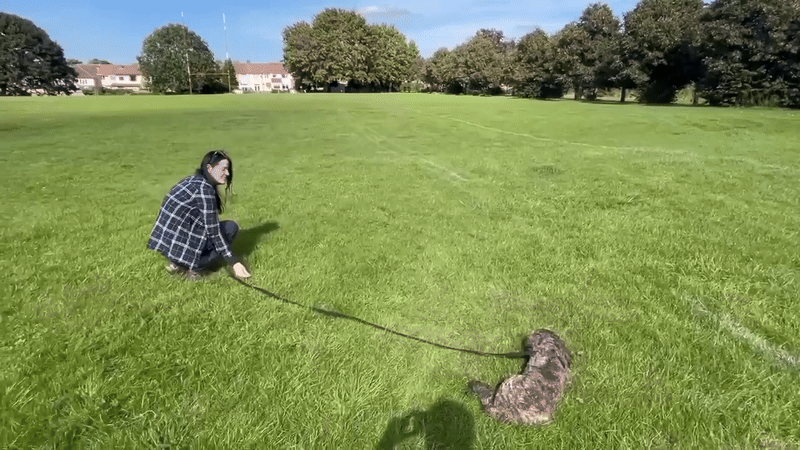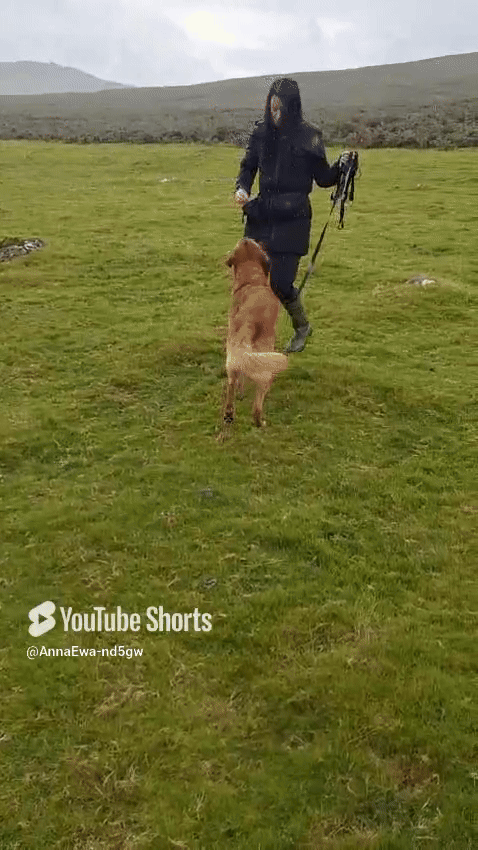Welcome
to
Time For Canines

The business
Time For Canines is dedicated to providing professional dog training and behavior consultation services. My mission is to help you build
a strong, positive relationship with your canine companion based on understanding and trust.
My Dog Training Philosophy
My approach to dog training is rooted in empathy, trust, and science. I believe in force-free, positive reinforcement methods that respect each dog's individuality and emotional well-being. Every dog is a unique learner, and my goal is to help them thrive by building
a strong, respectful bond with their human.
I stay committed to an evidence-based practice, continuously updating my methods to reflect the latest research in animal behavior and learning theory.
I actively collaborate with other trainers, behaviorists, and veterinary professionals to ensure that my clients receive the most informed, compassionate care possible.
Training, to me, is not about control—it's about communication and cooperation.
I work with both dogs and their people to create understanding, confidence, and lasting results, without ever using
pain, fear, or intimidation.


ARTICLES
Are you interested in dogs and like to spend some time reading?
Then you are in a right place :)
I am working hard to prepare some useful information for you!
ABOUT ME
My name is Anna, I’m originally from Poland,
though I currently reside in the UK.
My journey with dogs began in Poland, where I volunteered at a local rescue center and fostered dogs for several years. This experience taught me valuable lessons about the diverse ways dogs can behave, as well as the significant impact trauma can have on them. I discovered that with patience, gentle training, and effective communication, many dogs can recover from their past experiences.
Over the years, I also had the privilege of owning rescued dogs, which further deepened my understanding and experience in canine behavior.
In 2021, I adopted my German Shepherd, who turned out to be reactive—becoming one of my greatest teachers. To help him, I began attending various courses and webinars, diving deeper into the world of dog behavior and training.
This led me to pursue formal education through the Nordic Education Centre for Ethical Dog Trainers, which follows the methods developed by the renowned trainer, Turid Rugaas (famous for her groundbreaking work on Calming Signals, a crucial aspect of canine communication).
Today, my mission is to help both people and dogs understand the language of body signals, to work in a force-free and compassionate way, and to build strong, healthy bonds. By focusing on communication, empathy, and mutual respect, I aim to help dogs and their owners understand each other better and develop a positive, trusting relationship.
My qualifications:
-
-Nordic Dog Trainer LEVEL 4/ 2 YEAR COURSE: studying with Turid Rugaas, Lisbeth Borg de Waard, -Julia Robertson and Dr.Amber Batson
-
- Multiple courses and webinars from Grisha Stewart Academy
-
-Ethology and Evolution/ Roger Abrantes(PhD)
-
Agression Master Course/ Mike Shikashio
-
- in September 2024 attended PDTE conference in Dublin
-
Chronic Pain Symposium/ 3 day online event with lectures organized by Canine Arthritis Manangement
-
member of Animal Behaviour Kent Learning Platform


MEMBERSHIPS:
-joining now PDTE(The Pet Dog Trainers of Europe (was founded in 1998 by Norwegian dog expert Turid Rugaas, who has been at the forefront of canine communication for many years.
-Plymouth's Positive Dog Training Community -
a group founded by Rebecca Mitchel and team of other force free trainers and behaviorists from Plymouth


DOGS

Dogs (Canis lupus familiaris) have shared their lives with humans for thousands of years, but who they truly are goes far beyond being “man’s best friend.”
While dogs are not wolves, they do share a common ancestor with them. Over time, through a process known as domestication, dogs evolved into their own unique species—social, adaptable, and incredibly attuned to human life. Unlike their wild relatives, dogs have developed a remarkable ability to read human cues, live in diverse environments, and form deep emotional bonds with people.
A Look Back in Time
The earliest archaeological evidence of dogs dates back around 14,000 to 17,000 years, with some findings possibly even older. These ancient dogs lived alongside humans, likely drawn to our camps by food scraps and eventually becoming partners in hunting, guarding, and companionship.
Most Dogs Aren’t Pets
It may come as a surprise, but around 75% of the world’s dog population are free-ranging. These dogs live independently in cities, villages, and rural areas, often navigating the world without direct human care. Thanks to modern scientific research, we’re learning more about the behavior, needs, and communication of these dogs—knowledge that helps us better understand all dogs, including our pets.
What Is Ethology?
Ethology is the scientific study of animal behavior, especially in natural conditions. The field was pioneered by Konrad Lorenz, who emphasized the importance of observing animals in their natural environments to truly understand their behavior. Through such observations, we gain invaluable insight into why animals do what they do—and how we can interact with them in more respectful and informed ways.
Asking the Right Questions: Tinbergen’s Four
To truly understand behavior, scientists often turn to Nikolaas Tinbergen’s four questions:
-
Function – What is the purpose of the behavior?
-
Evolution – How did the behavior evolve over time?
-
Development – How does the behavior change with age or experience?
-
Mechanism – What causes the behavior in the moment (e.g., hormones, environment)?
These questions form the foundation of effective behavior analysis and help trainers and behaviorists address challenges in a thoughtful, evidence-based way.
Dogs Didn’t Choose This Life
It’s important to remember: dogs didn’t choose to live with humans—we brought them into our world. While many live comfortable, happy lives, too many are misunderstood or punished for simply expressing natural behaviors such as:
-
Barking – a form of communication
-
Chewing – a natural way to explore and self-soothe
-
Sniffing – how dogs gather information
-
Digging – instinctual behavior for some breeds
-
Guarding food or space – rooted in survival instincts
These behaviors aren’t “bad”—they’re normal. It’s our job to understand where they come from and teach dogs how to live with us in a way that’s fair and respectful.
Our Responsibility as Guardians
As humans, we have a deep responsibility to care for our dogs' emotional, physical, and social needs. This means teaching them using ethical, force-free methods, giving them opportunities to explore the world, and allowing them to just be dogs.
Let’s move beyond obedience and control—and toward partnership, trust, and understanding.
MY SERVICES
My dog training programs are designed to address specific behavioral needs, including recall, loose leash walking, resource guarding prevention, and reactivity prevention. I focus on teaching effective communication and understanding dogs needs.
1:1 session 40£/h
I provide personalized behavior consultation to address specific issues such as anxiety, reactivity and fear. My goal is to help your dog overcome challenges and thrive in a supportive environment.
1:1 consultation 100£(1,5h to 2h)
Reactivity Support Program:
Consultation + 4 sessions/ 210£
My puppy training sessions are tailored to promote healthy socialization, and building foundational life skills essential for a well-balanced adult dog. We guide both you and your puppy through this critical developmental stage.
1:1 session 40£/h
1:1 block of 4: 140£
Online classes, Webinars
In the future I am planning to offer workshops and webinars focused on enhancing your understanding of dog behavior, training techniques, and fostering a rewarding bond with your canine companion. At the moment you can choose online training or consultation.
Online consultation: 40£(1h)
Online training session: 25£/h
TRAINING
Solutions
Resolve common behavior issues like jumping, lack of focus, pulling on the lead, and more.
I will assist you in creating a harmonious relationship with your furry companion.

Outdoor Training
Experience outdoor training sessions to enhance your dog's skills. Gain insights on the right gear and techniques for success. Let me guide you in teaching new cues and behaviors.

Personalized Care
Receive personalized attention and care for your dog's training needs.
I am dedicated to helping you and your
dog build a strong bond through effective training methods.
HOW IT WORKS?
Book the session by contacting me via email or phone. I will set a free phone pre-consultation which will help me to know more about your dog's needs. After this we will meet for the session outdoor. Training session price include also follow-up, answering any questions and access to video material.
BEHAVIOUR CONSULTATIONS
&
REACTIVITY SUPPORT
Do you love your dog but struggling with unwanted behavior? Are you tired of searching online tips, contradictory information or unsolicited advice from others?

BARKING, LOUNGING
Barking and lounging is one of the most common reactive behaviours. It can be caused by variety of things like genetics, breed, health issues, gut disbiosis, lack of socialization or bad experience and trauma. Emotions behind reactive behaviours can be fear, anxiety or frustration. Dogs bark at things to increase distance. By reducing stress and addressing emotional needs of your dog we can significantly help to reduce unwanted behaviour.

STRESS
Stress in dogs can show up in many ways. Common signs include: excessive barking, hyperactivity, trouble focusing, reactivity or aggression towards people or other animals, pulling on lead. These are signals that your dog is feeling overwhelmed or uncomfortable.
Calm, structured routines can help dogs feel safe and more in control. Relaxation protocols, enrichment, and calming exercises teach dogs how to settle, reduce anxiety, and build emotional resilience. Over time, this leads to better focus, improved behavior, and a more relaxed, confident dog.

INDIVIDUAL NEEDS
Just like people, dogs have their own personalities, temperaments, and needs. What works for one dog might not work for another. Some dogs enjoy lots of interaction, while others need more space and quiet time.
By taking the time to truly observe and understand each dog—reading their body language and respecting their boundaries—we can support their emotional well-being and positively influence their behavior. Tailoring our approach helps build trust, comfort, and a stronger human-dog bond.
PUPPIES
Just welcomed a new puppy into your life?
Want to give them the best start possible?

SOCIALISATION

FOUNDATIONS

PREVENTION
An unsocialised puppy may grow up to be fearful, anxious, or reactive in new situations or around people and other dogs. This can lead to behavior issues and stress for both the dog and the owner.
A well-run puppy class provides safe, positive experiences with new people, dogs, sounds, and environments—helping your puppy grow into a confident, well-adjusted adult.
Early socialisation done right makes a big difference!
Teaching your puppy good manners from the start—like not jumping (did you know that jumping can have negative impact on joints?), toileting routines, loose leash walking, recall, and calm greetings—sets them up for success.
Early training builds healthy habits and makes life easier for both you and your pup!
Exercises like “leave it” or “drop“ , trading items, and learning to relax can do more than just teaching obedience—they help prevent future issues like resource guarding, reactivity, or even aggression.
These exercises build trust and communication skills. By teaching your puppy to feel safe when giving things up or handling different social situations, you’re laying the foundation for a confident, well-mannered adult dog. It's not about controlling the dog is about teaching him life skills.
GALLERY













FORCE FREE APROACH
Ethics in animal behavior and training means treating animals with respect, kindness, and compassion. It involves using humane, force-free methods, understanding their needs and emotions, and ensuring their well-being is always the top priority. Ethical training builds trust—not fear.
Using punishment-based methods—like yelling, leash jerks, shock collars, or intimidation—can be harmful to dogs and damaging to the human-animal bond. Studies show that these methods increase the risk of aggression, fear, and stress-related behaviors. They can also cause dogs to make negative associations with people, places, or situations, leading to long-term emotional harm.
Understanding Through Learning Theory
By applying learning theory, we can better understand how animals learn. Positive reinforcement—rewarding the behaviors we want—strengthens trust, communication, and cooperation. In contrast, punishment may suppress behavior temporarily but doesn’t teach the dog what to do instead, and often adds fear or confusion.
The Scientific and Ethical Choice
Force-free, reward-based methods are not only more effective—they’re also safer and kinder. Leading organizations such as the American Veterinary Society of Animal Behavior (AVSAB), British Veterinary Association, and International Association of Animal Behavior Consultants (IAABC) all recommend avoiding punishment-based methods in favor of humane, science-based training.
Backed by Research
A 2020 study published in PLOS ONE showed that dogs trained using aversive methods displayed more stress-related behaviors and had higher cortisol levels compared to those trained with positive reinforcement. Long-term use of punishment can also increase anxiety and reduce a dog's ability to learn.
RECOMMENDED RESOURCES
CANINE ENRICHMENT/ SHY KELLY FB GROUP
https://www.facebook.com/groups/137561280156280?locale=en_GB
DOG CENTERED CARE/ANDREW HALE FB GROUP
https://www.facebook.com/groups/1102691126911105?locale=en_GB
Positive Force Free R+ Dog Training Library
https://www.facebook.com/groups/839534162744930?locale=en_GB
BHARCS CANINE COMMUNICATION FREE COURSE
https://www.youtube.com/watch?v=OUHaDSp1lrw&list=PLBkWfFu7ur7FVnka-t7astgH_c3MazS-Z
ARTICLE ABOUT CALMING SIGNALS
http://en.turid-rugaas.no/calming-signals---the-art-of-survival.html

CONTACT
+447511449893